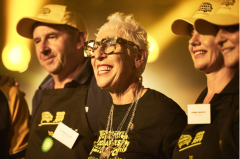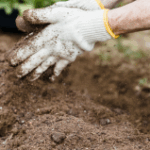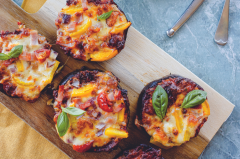Discover how OzHarvest food rescue is transforming lives by reducing food waste, feeding vulnerable communities, and fighting hunger across Australia.
“Food is way more than the nutritional value,” says Ronni Kahn AO. “It’s about sharing, it’s about caring and it’s about elevating the spirit and making people feel comfortable and wanted.”
It’s been a long journey for the food-waste activist and social entrepreneur to recognise this. “I was a picky eater,” Kahn says, recalling her childhood mealtimes. “I ate chops and chips… I never ate my vegetables!” Her mother was a skilled cook, but Kahn never appreciated what was on her plate at the time. She smiles from behind her square-rimmed glasses. “It’s something I regretted — a little late — but have made up for it.”
To say that Kahn has made up for it is an understatement. In 2004, she founded OzHarvest, a food rescue charity, rescuing quality food from going to landfill and delivering it to those most in need — a Robin Hood of food wastage. OzHarvest rescues quality surplus food from commercial businesses including supermarkets, airlines, restaurants and hotels and delivers them for free to charitable agencies including homeless shelters, women’s shelters and rehabilitation centres.
Kahn also started the world’s first free supermarket. There are now two OzHarvest Markets — one in Sydney and one in Adelaide. The shelves are stocked with surplus fresh produce and pantry staples rescued from commercial supermarkets and other food businesses, which “shoppers” can access for free.
Through her work, Kahn has also been influential in changing laws. Alongside a team of pro-bono lawyers, she lobbied state governments to amend legislation to allow potential food donors to give their surplus food to charity without fear of liability. They were successful.
At 72 years old, Kahn is also a leading voice in both the national and global dialogue on food waste, and has received endless accolades for her work, including receiving the 2010 Australia’s Local Hero Award and, more recently, the Officer of the Order of Australia (AO) in 2019.
Seedlings of activism
Kahn was born in South Africa in the 1950s and grew up in Johannesburg. While she was too young to understand the full extent of the political landscape in the country at that time, she feels that the injustices she witnessed back then may have laid the foundations for her passion for social activism.
“Being brought up in South Africa during the apartheid era meant that I physically was seeing people who needed food, all day, every day. But I was little, and I didn’t really compute [the magnitude of the issue],” she recalls. While starting a charity wasn’t something that ever crossed her mind at that age, Kahn became increasingly aware of social inequality and privilege.
In her university years, she moved to Israel on a study scholarship and it was here that she got married and had her two sons. She spent a decade living on a kibbutz, a communal settlement where more than 300 people lived, worked and shared food and farmland together. Seeing how much hard work and resources went into creating food was also an eye-opener for Kahn and laid the foundations for her later passion in tackling food wastage.
Seeking a better life, Kahn and her family emigrated to Australia where she started her own business as an event planner in Sydney. It was during these events that the seedling of Kahn’s passion to prevent food waste really started to blossom.
A superhero in stilettos
After each event, Kahn was horrified at how much quality food was thrown out. After one particular corporate event, where food for around 1000 people was mostly untouched, she decided to do something about it.
“I had wonderful stalls of beers and kegs of wine, and people just went straight for the drinks and didn’t touch the food. There were thousands of kilos of food, and it just was unconscionable,” says Kahn, recalling that day. “It had never occurred to me before, but on that day, I just said, ‘I am not throwing away this food,’ and that moment fundamentally changed my life.”
Kahn boxed up the food and drove it to the nearest shelter. Still wearing the stilettos that she’d been working in all day, Kahn trotted up to the door, arms aching under boxes overflowing with food and asked if she could hand it over. The shelter gratefully accepted.
But, at that time, it wasn’t so much a desire to solve hunger that motivated her. She simply saw a problem and wanted to fi nd a solution. That moment inspired Kahn to set up OzHarvest, a charitable organisation to help solve the issue of food waste — to rescue discarded quality food from a network of more than 2000 commercial food donors and redirect it to those in need.
Since that day, OzHarvest has delivered more than 280 million meals and prevented around 70,000 tonnes of edible food from being sent to landfill. Not only does this feed people in need, but their eff orts are helping to tackle the harmful impact of food wastage on the environment. According to the UNEP Food Waste Index Report 2021, up to 10 per cent of global greenhouse gases are associated with food that is produced but not consumed.
And for the charities and shelters that receive deliveries from OzHarvest, the impact goes beyond just putting nourishing foods into hungry bellies.
Funds that would have been allocated to ever-increasing food bills can now be redirected to community programs focusing on things such as education or rehabilitation. “Some [shelters] have told us that we’ve saved them around $100,000 a year, which means they can use that for other programs,” says Kahn.
Today, OzHarvest employs almost 400 staff and has around 3500 volunteers, in Australia alone. The business model has been replicated overseas in New Zealand, the UK, South Africa, Vietnam and Japan.
There’s something fishy about the salmon
It was an incident with a salmon that sparked Kahn’s realisation that there was a knowledge gap in food education, and this was playing a big role in wastage. This was particularly true for people who had only been exposed to a limited selection of foods, or only processed and pre-packaged food from the supermarket like frozen fish fingers and chicken nuggets.
When the team on cooking show MasterChef had a whole salmon leftover, they called and asked if OzHarvest wanted to rescue it. Knowing good-quality protein was hard to come by, Kahn’s team gratefully collected it and took it to one of their charity agencies, where a chef cooked and served it. But a couple of days later, Kahn got a call to say that some people had refused to eat the salmon, thinking it was off simply because it was pink.
“They’d never seen a pink fish!” says Kahn. “A lot of charities, all they could afford before us, often, was white bread, jam, bangers and mash, and then we started bringing olive bread, wholewheat bread, artisanal breads.” Being exposed to and educated about different types of food was important to change attitudes and behaviours. “It’s about a whole shift and change in the mindset of people who’ve never eaten a broad spectrum of food.”
This opened up Kahn’s mind to not just feeding people but giving them the knowledge and skil





